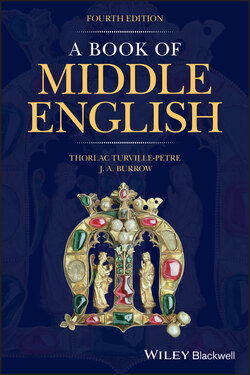Читать книгу A Book of Middle English - J. A. Burrow - Страница 53
4.5.8 The Verb ‘To Be’
ОглавлениеThis is particularly irregular, and has wide variation in form in different regions. Some parts of the present indicative have two forms from different stems; where there are alternatives the b‐ forms are often used in a future sense, as in swa þe bið alre laððest, ‘as shall be most hateful to you’, 3/152.
To illustrate the variety, here are the forms of the verb ‘to be’ in the language of the Ancrene Wisse and Gawain:
| Ancrene Wisse | Gawain | ||
| infinitive | beon | be, bene | |
| present indicative | |||
| sg. | 1 | am, beo | am |
| 2 | art, bist | art | |
| 3 | is, bið | is, betz | |
| pl. | beoð | ar(n), ben | |
| present subjunctive | |||
| sg. | beo | be | |
| pl. | beon | be(n) | |
| past indicative | |||
| sg. | 1 | wes | watz, was |
| 2 | were | watz, were | |
| 3 | wes | watz, was | |
| pl. | weren | wer(en) | |
| past subjunctive | |||
| sg. | were | wer(e) | |
| pl. | weren | wer(e), wern | |
| past participle | ibeon | ben(e) |
Chaucer gives his Northern students is throughout the singular as extreme Northernisms.
Negative forms may be illustrated from Sir Orfeo: present nam, nis; past nas, nere.
